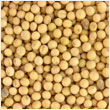|
|
Agricultural Products:
Grains and Oilseeds > Soy bean
Soybean
Canada's soybeans are global leaders in quality and value. Around the world, Canadian soybeans are the first choice of processors who are at the leading edge of emerging trends in soyfoods
Canada is envied around the world for its clean air and sparkling waters. It is also a country with deep, fertile soils that produce healthy roots and strong, productive soybean crops.
 Canadian soybeans are planted primarily in the Great Lakes - St. Lawrence River basin. Here, our climate is moderated by the world's largest fresh water system, providing the uniform temperatures and rainfall that are essential for year-in, year-out consistency and for dependably high soybean yields. Now, new production zones are being opened in Manitoba, further enhancing our ability to develop and produce soybeans for all soyfood. Canadian soybeans are planted primarily in the Great Lakes - St. Lawrence River basin. Here, our climate is moderated by the world's largest fresh water system, providing the uniform temperatures and rainfall that are essential for year-in, year-out consistency and for dependably high soybean yields. Now, new production zones are being opened in Manitoba, further enhancing our ability to develop and produce soybeans for all soyfood.
Our natural resources and geography add up to an advantage that produces real results. Since 1980, Canadian soybean production has climbed 450%, exceeding 3.1 million tonnes on 2.9 million acres in 2005. Current forecasts suggest further steady, manageable growth, reaching 3.5 million acres within a decade.
Soybeans make up about 70% of the world's output of the 7 major oilseeds (soybeans, cottonseed, peanut, sunflower seed, canola/rapeseed, copra and palm kernel). The importance of soybeans in the oilseeds sector continues to grow with output expanding by one-quarter or 55 million tonnes (Mt) since 2000-01. (Agri-Canada)
Soybean growers in Canada have evolved their farms and their farming practices in order to become world leaders in food quality soybean production.
Supported by a world-class network of public and private agronomists, crop scientists and soybean breeders, Canada's soybean growers make the growing of food quality soybeans a multi-year commitment. Growers manage their crop rotations, their tillage systems and their planting and harvesting schedules with the goal of consistently producing superior soybeans.
Growers also meet frequently during the growing season with elevators in order to adopt the newest practices and to ensure they grow, scout and manage their crops according to the detailed requirements of buying companies. Growers treat their soybeans as food crops. For example, all growers who apply agricultural pesticides in Ontario must first be licensed by the provincial government and can only use pesticides when and where required.
Canada's soybean industry features growers who have also installed separate storage bins and who meticulously maintain their equipment (planters, harvesters, etc) in order to meet the most stringent identity-preserved standards.
In order to produce superior food quality soybeans, a country must have top quality elevators. Canada's soybean elevators are unsurpassed.
Elevators that harness quality
Grain elevators play many essential roles in delivering food quality soybeans. In the Canadian system, food quality soybeans are typically produced by growers under contract to the elevator. The elevator determines the exact production standards that are required for purity and quality. Then, the elevator's soybean team maintains close contact with the growers, including field visits, so that the growers can dependably achieve these standards.
The elevator also controls the delivery of the soybeans, ensuring food quality soybeans are binned separately to prevent contamination. Elevators painstakingly test every farm delivery to ensure it meets all quality criteria before allowing the soybeans to be unloaded.
As well, Canadian soybean elevators are equipped with state of the art processing equipment. Many have added Harada sizers to their already excellent processing lines of clippers, gravity sorters, destoners and polishers.
As a result, Canada's elevators not only maintain the quality of the soybeans they receive. They actually improve their quality. It is through this commitment that Canada has steadily increased its sales of food quality soybeans to the world.
Identity Preservation
Created in consultation with global buyers, Canada offers the world's most integrated system of identity preservation with an unmatched record of delivering specific soybeans to specific purchasers. Three quarters of our soybean exports to Asia are now classified as identity-preserved, shipped via containers or in bulk as required by the customer.
Operated under the leadership of the Canadian Grain Commission, the Canadian Identity Preserved Recognition System (CIPRS) is strengthened with independent third part audits and certification.
Standards protect purity at all points, including the seed producer, the soybean farm, and the elevator and shipping system. In addition, soybeans are sampled and analyzed at key steps along the way, and identity-preserved soybeans are stored in separate, rigorously managed bins.
Soybeans which cannot be traced to the purchase of Certified seed, and soybeans which fail purity and quality tests, are not allowed into the Canadian identity-preserved system.
Our global reputation rides with every shipment.
Third-party Grading
Food quality soybeans are of the highest quality, meeting strict tolerances for soundness, cleanliness, uniformity of size, color, test weight and a long list of other criteria. In addition, shipments may also be analyzed for specific contract requirements, such as protein content or, in the case of identity-preserved shipments, the soybean variety.
Third-party grading is a key factor in the Canadian Advantage. (CSEA)
|


 

|